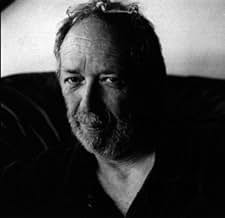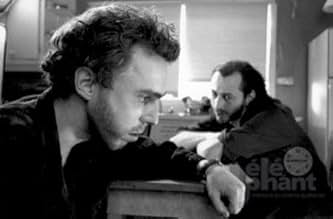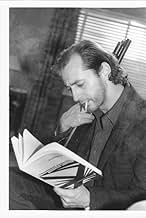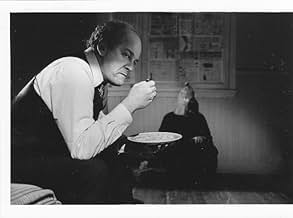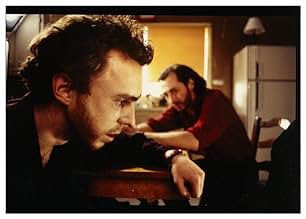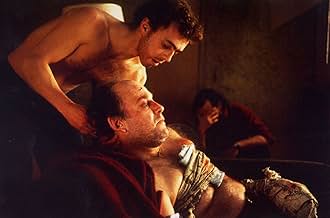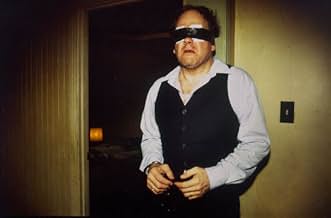Añade un argumento en tu idiomaA dramatization of the infamous Canadian terrorist abduction & murder of a government minister by a cell of The Quebec Liberation Front.A dramatization of the infamous Canadian terrorist abduction & murder of a government minister by a cell of The Quebec Liberation Front.A dramatization of the infamous Canadian terrorist abduction & murder of a government minister by a cell of The Quebec Liberation Front.
- Dirección
- Guión
- Reparto principal
Hugolin Chevrette-Landesque
- Neveu
- (as Hugo C. Landesque)
Reseñas destacadas
8N.L.
I saw this film shortly after it was released as part of a "sneak peak" series in Philadelphia. Not a single member (including me) of the otherwise well-read and educated audience knew anything about the historical events depicted in the film. This was embarrassing to say the least! In the discussion afterward, it was obvious that the audience universally appreciated the film, but it was also apparent that it would be a hard sell to U.S. ticket-buyers. So it became no surprise that it was not picked up for U.S. distribution. Because of woeful ignorance of most-things-Canadian that exists south of the border - and god forbid! subtitles - OCTOBRE vanished from our radar in the U.S.
If I had to use only one word to describe this movie, I'd say "strong". This movie is intense, thought-provoking and at the same time it is very smart.
I think it's pathetic that people said it was either white or black just because it was one of Falardeau's work (and that he's doing "propaganda" for the separatists). That is like saying soveregnists are too dumb to understand what they are fighting for, but the true stupid ones are those who didn't see the shades of grey in this movie. This film was not intended to show "bad guys" and "good guys", it was a movie about five men living hell in a small house for an entire week. Quebecers know their story, so the movie does not tell all the events that happened in Quebec during that time, it tells about something nobody is sure about, because what happened in this little house is only known by the five guys that were there. The movie is based on a book written by one of the guy, 12 years later, but Falardeau also read -many- documents about the events to be sure he was sticking to the facts when it came to the political/historical elements [read his book "La liberté n'est pas une marque de yogourt", for more info].
The "felquistes" have a heart in this movie, but some people think this is just to make us believe they were the "good guys". I believe thinking that is idiotic, because if the felquistes are shown as being nice, it doesn't mean the movie says they did not make a mistake. And a big one. See, that's what I meant about the shades of grey. Also, for younger Quebecers or people outside Quebec, a whole dimension of the movie --and of the felquist act-- is not understood, and that is when they [the felquists] say that they worked for English bosses that did anything they wanted to them. People tend to think the guy that says that in the movie is only talking about HIS situation, but he's talking about the general situation of Quebecers at that time: slaves to the English, "inferior" people that could not be given respectable roles in companies.
The dialogues are very interesting and the actors deliver an incredible performance. The silences toward the end of the film are heavy and highly dramatic... A true must-see for people interested in this part of Quebec's history, but you must know the political/historical/social setting to understand.
I think it's pathetic that people said it was either white or black just because it was one of Falardeau's work (and that he's doing "propaganda" for the separatists). That is like saying soveregnists are too dumb to understand what they are fighting for, but the true stupid ones are those who didn't see the shades of grey in this movie. This film was not intended to show "bad guys" and "good guys", it was a movie about five men living hell in a small house for an entire week. Quebecers know their story, so the movie does not tell all the events that happened in Quebec during that time, it tells about something nobody is sure about, because what happened in this little house is only known by the five guys that were there. The movie is based on a book written by one of the guy, 12 years later, but Falardeau also read -many- documents about the events to be sure he was sticking to the facts when it came to the political/historical elements [read his book "La liberté n'est pas une marque de yogourt", for more info].
The "felquistes" have a heart in this movie, but some people think this is just to make us believe they were the "good guys". I believe thinking that is idiotic, because if the felquistes are shown as being nice, it doesn't mean the movie says they did not make a mistake. And a big one. See, that's what I meant about the shades of grey. Also, for younger Quebecers or people outside Quebec, a whole dimension of the movie --and of the felquist act-- is not understood, and that is when they [the felquists] say that they worked for English bosses that did anything they wanted to them. People tend to think the guy that says that in the movie is only talking about HIS situation, but he's talking about the general situation of Quebecers at that time: slaves to the English, "inferior" people that could not be given respectable roles in companies.
The dialogues are very interesting and the actors deliver an incredible performance. The silences toward the end of the film are heavy and highly dramatic... A true must-see for people interested in this part of Quebec's history, but you must know the political/historical/social setting to understand.
Again, Falardeau has put his camera where it hurts, where a camera should be ! A lot where fearing a radical, simplistic view of the events of October 1970, but were surprised to witness that the director's take on the FLQ's actions were concentrated mostly on the human aspect. These men were not brainwashed activists or militarily trained supermen, they were Quebec workers, french speaking working class citizens who got fed up with oppression and decided to wake up a nation. But by doing so, one soon realizes that he has to be willing to give up everything for the cause. These guys were not super heroes, they were not mindless protesters; they doubted, they feared, they hoped, they laughed, they cried, they hurt each other, they despaired...they were and are human beings. Real human beings. And that's what interested Falardeau. Ordinary people taking extraordinary measures to shake a system that doesn't want to listen to them. But they found themselves in a dead end once the government decide to send in the army instead of negotiating. If they would have let the hostage go, they're whole operation would have seemed as a farce and the demands of Quebec would once again not be taken seriously. But as they say in the film, they were not murderers. They were faced with a dilemma: go all the way or be forever sheep in a country that does not even recognize the existence of their nation. You can feel all the pressure of that dilemma in "Octobre". And to me, that is the main reason for the film's being. It is not simplistic. It does not evacuate the moral issues of the actions taken by the protagonist. It shows the other side of a revolution, the human difficulties that go with it. And that is no minor task. For once, in Quebec, we were told a story from a non-institutional point of view. And only this, to start with, makes "Octobre" essential viewing.
As a movie, Octobre is not very interesting, except maybe for Quebeckers that might want to renew with a part of their past, in a fictionalized way.
As a documentary, Octobre is totally wrong, showing us just one biased side of the story, failing to describe the reality.
The felquists are well played by the lead actors but the story is not very inspiring. After kidnaping the minister of Labor, Pierre Laporte, they wait for the government to negotiate with them. They want the independence of Québec.
Falardeau, himself in favor of independence from Canada, presents the felquists as heros, good guys that needed to do what they've done, for the «cause». While in fact, these guys are just fanatics that read a little too much books about the Revolution. They had the arrogance to think that they were talking for everybody else, that Quebeckers were a 100% behind them.
So it goes on! They kidnaped the minister but they treat him like a friend. Maybe a little bit more water, monsieur le ministre! We're sorry we have to do that! They even give a good tip to the delivery guy! I think it's a manipulative way for Falardeau to present the felquists as martyrs of the independence. And one of the felquists to say: «If we didn't had heart, we wouldn't be here today»...
As all terrorists, the felquists in this movie had an utopian idea of the country where they wanted to live. They were sure about one thing: they were right. And Falardeau, by making this movie, wants us to have sympathy for those guys. Well, sorry Mr Falardeau, but I think your movie may appeals to some independists from Québec, but no more. Cause, once again, as a movie, it's not that good, and as a documentary, it's just propaganda.
Because of the acting, I gave this movie 73 out of 100. That's good for **½ on a **** stars rating system.
Seen at home in Welland, on January 29th, 2002.
As a documentary, Octobre is totally wrong, showing us just one biased side of the story, failing to describe the reality.
The felquists are well played by the lead actors but the story is not very inspiring. After kidnaping the minister of Labor, Pierre Laporte, they wait for the government to negotiate with them. They want the independence of Québec.
Falardeau, himself in favor of independence from Canada, presents the felquists as heros, good guys that needed to do what they've done, for the «cause». While in fact, these guys are just fanatics that read a little too much books about the Revolution. They had the arrogance to think that they were talking for everybody else, that Quebeckers were a 100% behind them.
So it goes on! They kidnaped the minister but they treat him like a friend. Maybe a little bit more water, monsieur le ministre! We're sorry we have to do that! They even give a good tip to the delivery guy! I think it's a manipulative way for Falardeau to present the felquists as martyrs of the independence. And one of the felquists to say: «If we didn't had heart, we wouldn't be here today»...
As all terrorists, the felquists in this movie had an utopian idea of the country where they wanted to live. They were sure about one thing: they were right. And Falardeau, by making this movie, wants us to have sympathy for those guys. Well, sorry Mr Falardeau, but I think your movie may appeals to some independists from Québec, but no more. Cause, once again, as a movie, it's not that good, and as a documentary, it's just propaganda.
Because of the acting, I gave this movie 73 out of 100. That's good for **½ on a **** stars rating system.
Seen at home in Welland, on January 29th, 2002.
Octobre - I have vivid memories of this sad time. I hoped this would be a film with a message for history. I didn't see it.
The idea that characters in this film tried to break out of their role in some human fashion is a mystery to me. The results of real-life October 1970 was not as complex as this film claims: The FLQ kidnapped and murdered a politician. That is not human - it is inhuman.
Another idea in this film is that the terrorists were simply working class people who got fed up with oppression and tried to wake up a nation. Once again the truth I remember in 1970 wasn't that complex. By kidnapping and murdering they became the oppressors they hated. Kafka was right - the rebel who kills the oppressor eventually becomes the oppressor.
Saddest of all for me is the film's implicit message that the FLQ terrorists were somehow faced with a dichotomy: to remain oppressed or to kill their kidnap victim for recognition.
How different is that from Islamic terrorists flying planes into buildings and others who think that they too are oppressed and unrecognized? I hope someone will someday make another film about this sad chapter in Quebec/Canadian history. And I hope that film will portray a vivid lesson that I learned living through that awful time: Murder and violence is an affront to humanity and will never build a civil or livable country! THAT is the only lasting message I remember from the October Crisis.
The idea that characters in this film tried to break out of their role in some human fashion is a mystery to me. The results of real-life October 1970 was not as complex as this film claims: The FLQ kidnapped and murdered a politician. That is not human - it is inhuman.
Another idea in this film is that the terrorists were simply working class people who got fed up with oppression and tried to wake up a nation. Once again the truth I remember in 1970 wasn't that complex. By kidnapping and murdering they became the oppressors they hated. Kafka was right - the rebel who kills the oppressor eventually becomes the oppressor.
Saddest of all for me is the film's implicit message that the FLQ terrorists were somehow faced with a dichotomy: to remain oppressed or to kill their kidnap victim for recognition.
How different is that from Islamic terrorists flying planes into buildings and others who think that they too are oppressed and unrecognized? I hope someone will someday make another film about this sad chapter in Quebec/Canadian history. And I hope that film will portray a vivid lesson that I learned living through that awful time: Murder and violence is an affront to humanity and will never build a civil or livable country! THAT is the only lasting message I remember from the October Crisis.
¿Sabías que...?
- CuriosidadesPierre Falardeau: The homeless man up the stairs in the second subway station scene.
- ConexionesEdited into Black October (2000)
Selecciones populares
Inicia sesión para calificar y añadir a tu lista para recibir recomendaciones personalizadas
Detalles
- Fecha de lanzamiento
- País de origen
- Sitio oficial
- Idiomas
- Títulos en diferentes países
- Outubro Violento
- Localizaciones del rodaje
- Empresas productoras
- Ver más compañías en los créditos en IMDbPro
Taquilla
- Recaudación en Estados Unidos y Canadá
- 349.633 US$
Contribuir a esta página
Sugerir un cambio o añadir el contenido que falta

